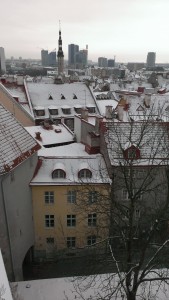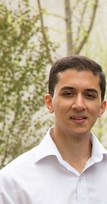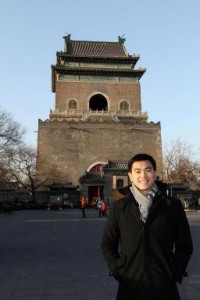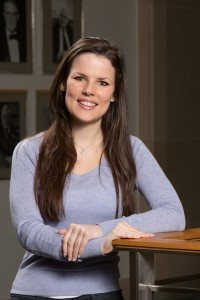 Just a week before Derek arrived in Tallinn, the capital of Estonia, the city implemented a new program eliminating fares on public transportation for city residents. For Derek — who came to Harvard to study urban planning, then became interested in how legal institutions affect how cities develop — this was a local experiment with global significance. “An idea like this helps people get around and save money, but it also challenges the traditional ways that the law thinks about how cities should be governed,” he explained, involving issues ranging from fiscal structures and shifts in urban population to politically marginalized communities. By traveling to Tallinn, Derek was able to do archival research with medieval documents that helped to explain Estonia’s long tradition of local autonomy, then visit City Hall to interview
Just a week before Derek arrived in Tallinn, the capital of Estonia, the city implemented a new program eliminating fares on public transportation for city residents. For Derek — who came to Harvard to study urban planning, then became interested in how legal institutions affect how cities develop — this was a local experiment with global significance. “An idea like this helps people get around and save money, but it also challenges the traditional ways that the law thinks about how cities should be governed,” he explained, involving issues ranging from fiscal structures and shifts in urban population to politically marginalized communities. By traveling to Tallinn, Derek was able to do archival research with medieval documents that helped to explain Estonia’s long tradition of local autonomy, then visit City Hall to interview the deputy mayor and director of transportation. Equally important, “I could wait at a bus stop, ask people for change (because I still had to pay), and see who was using the bus,” Derek remembered; “It’s a popular policy, voted in by a referendum, but there was also a lot of cynicism, a sense of disillusionment with the politics behind it.” His winter term project has given him a “rich vein of material” for his academic work and an appetite for more international travel: “I want to go to places where there’s something to learn from.”
the deputy mayor and director of transportation. Equally important, “I could wait at a bus stop, ask people for change (because I still had to pay), and see who was using the bus,” Derek remembered; “It’s a popular policy, voted in by a referendum, but there was also a lot of cynicism, a sense of disillusionment with the politics behind it.” His winter term project has given him a “rich vein of material” for his academic work and an appetite for more international travel: “I want to go to places where there’s something to learn from.”
(Please visit “Winter Term 2013: Snapshots from Students” to read about other recent projects.)





